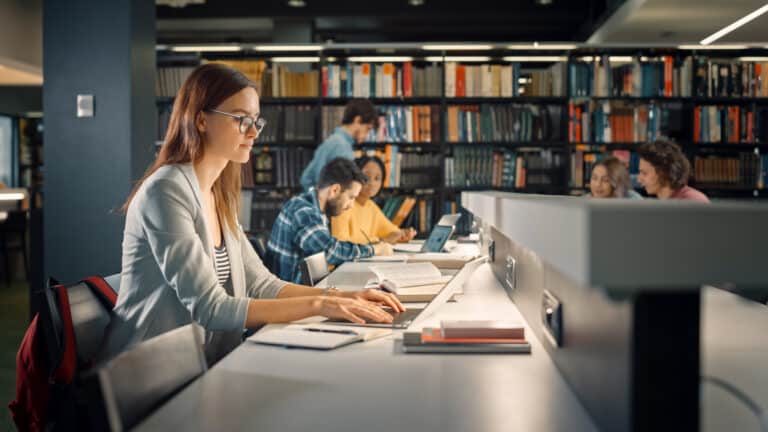Full program: Live sessions
The LL.M. program includes five MOOCs, a series of twenty live sessions, a research paper and a personalized evaluation.
About the live sessions
Live sessions involve remotely live contacts between professors and students through Zoom or Teams.
INTRODUCTORY SESSIONOne introductory live session takes place every year on the last Saturday of August at 2:00 pm (Belgian time – UTC +2) before the program get started in September.
GET-TOGETHER SESSIONS
A get-together session is organized roughly once every two months. Students are free to attend as they see fit. The purpose of these sessions is twofold. On the one hand, they are an opportunity for students to ask the LL.M. team any administrative or organizational questions they may have. On the other hand, students may pass on any comments or difficulties they may have to the LL.M. team.
LIVE SESSIONS
The other live sessions are remote teaching lectures by professors. They last 2 hours each and usually take place every two weeks on Saturdays at 2:00 pm (Belgian time – UTC +2), except during the exam period. Students must prepare each live session by reading texts, watching pre-recorded videos or completing quizzes posted by the professor on the relevant platform.
The LL.M. program offers two series of ten live sessions. The first ten live sessions focus on specific issues related to the MOOCs, with two live sessions for each MOOC. They take place from September to December. The other ten live sessions focus on current topics, with five sessions on international justice and five sessions on the international protection of the environment. Those sessions take place from February to May.
Still have questions?
Live sessions on specific issues related to the MOOCs
a) The first session will address issues concerning territorial sovereignty. Territory is intimately linked to statehood and it has been at the heart of most wars between States. But territory is also a natural feature whose acquisition and delimitation are governed by international law. The session will unpack those rules through the analysis of various important cases decided by international courts and tribunals that will be assigned as readings.
b) The second session will be dedicated to the United Nations and to the role played by international law in the UN context, in particular the Security Council, the General Assembly and the Human Rights Council. Taking a specific international crisis as a reference point for analysis, it will navigate the various bodies and procedures in order to observe how States behave and use international law.
Live session by Pierre d’Argent
a) Extending the prohibition of discrimination to discrimination on grounds of poverty or socio-economic disadvantage
The fight against discrimination on socio-economic grounds has a key role to play in the eradication of poverty, and particularly in combating the inter-generational transmission of poverty. “Social origin” and “property” are listed as prohibited grounds of discrimination in article 2(2) of the International Covenant on Economic, Social and Cultural Rights, and in its General Comment No. 20 on non-discrimination (2009), the Committee on Economic, Social and Cultural Rights reiterated that: “Individuals and groups of individuals must not be arbitrarily treated on account of belonging to a certain economic or social group or strata within society. A person’s social and economic situation when living in poverty or being homeless may result in pervasive discrimination, stigmatization and negative stereotyping which can lead to the refusal of, or unequal access to, the same quality of education and health care as others, as well as the denial of or unequal access to public places” (para. 35). In practice however, the requirement to protect people from discrimination on grounds of social status is, at best, highly uneven, and there are in fact few examples of this ground being used effectively. And people in poverty still experience various forms of discrimination, based mostly not on the level of incomes per se, but on family relationships, on the schools the person has attended, or on childhood circumstances. This live session, organized in the form of an interactive debate, will take as departure point the 2022 report of the Special Rapporteur on extreme poverty and human rights on this issue.
b) The non-take-up of rights: an obstacle to the effective implementation of social rights
As discussed in a 2022 report of the Special Rapporteur on extreme poverty and human rights, “non-take-up” refers to the phenomenon of intended beneficiaries not claiming certain benefits — for instance, the child allowances, unemployment benefits, social assistance, or old-age pension. While a model of rational behaviour can explain certain instances of non-take-up (the costs of claiming certain forms of assistance, where the level of support is small or eligibility uncertain, may exceed the benefits; specific hurdles may exist; etc.), many scenarios of non-take-up in fact require that we move beyond that model to understand the cognitive barriers people in poverty face, using the tools of behavioural psychology. Some instances of non-take-up may also be explained by the institutional and social abuse people in poverty may have experienced, their fear not to be able to comply with certain conditionalities, or the digitilization of welfare. In this live session, we will seek to understand non-take-up; contrast the various explanations; and draw certain policy implications, including as to the impacts on the interpretation of the requirements of human rights norms
Live session by Olivier DE SCHUTTER
The two live sessions will be devoted to presentations by practitioners, including military staff, members of NGOs, ICRC or Red Cross/Crescent delegates, lawyers or any other persons involved in IHL on the ground. Those presentations will address a specific issue examined during the MOOC from the point of view of the practice, such as the targeting, the humanitarian assistance, the role played by the ICRC or the implementation of IHL.
Live session by Raphaël van Steenberghe & Jérôme de Hemptinne
a) In the first session, we will discuss the extent to which international investment law and arbitration hampers the exercise by States of their normative prerogatives. For that purpose, we will focus on indirect expropriation and the fair and equitable treatment. This discussion will build on the analysis of the relevant arbitral practice and of recent trends in treaty practice.
b) In the second session, we will discuss the on-going reform of the settlement of investor-state disputes. The focus will be twofold. We will first of all focus on the reform of investor-State arbitration, as illustrated by the amendment in 2022 of the ICSID Rules and Regulations. We will then focus on the options implemented in treaty practice, and more generally discussed, to replace investor-State arbitration with other methods of dispute settlement.
Live session by Yannick Radi
a) One of the main challenges for the international protection of asylum seekers is safe access to territories where they could benefit from the principle of non-refoulement and the granting of effective protection. This issue is linked to the territorial applicability of the principle of non-refoulement and to the intervention of private actors on migration routes.
b) The year 2022 saw the Temporary Protection Directive applied for the first time by the European Union. Within days, the Council decided to implement it to offer an ad hoc status to people fleeing Ukraine. What are the contours of this protection? How does it differ from refugee status on the basis of the Geneva Convention? Is this a sign that the Geneva Convention has not fallen into disuse and could be a useful instrument in the future?
Live session by Dr Sylvie Saroléa & Jean-Yves Carlier
Live sessions related to current topics
Related to international justice
This live session aims at providing students with an overview of the current challenges faced by international judicial mechanisms, with a particular focus on the judicial activities of the International Court of Justice (ICJ) and the International Tribunal for the Law of the Sea (ITLOS). In doing so, particular attention will be drawn to the following questions: increased recourse to international courts in a fragmented multilateral world; “consent” and access to courts in inter-State litigation; working methods and functioning of international courts. Reading materials will be made available to the students. A Q and A session will follow the session.
Live session by Philippe Gautier
This session will provide an in-depth analysis of procedural and jurisdictional issues relating to the bringing of contentious proceedings before the International Court of Justice. It will draw from recent cases and explain, from the point of view of litigants, how to bring a case and what to expect along the way. The interplay between judicial means of settlement and direct settlement by negotiations will also be addressed.
Live session by Pierre d’Argent
This live session will explore current immunity issues in international law, with a focus on State immunity and diplomatic immunity. Based on recent evolutions in case-law and ongoing developments in international practice, it will discuss, in particular, the tension between immunity rules and the transnational enforcement of human rights or the fight against impunity for international crimes.
Live session by Frédéric Dopagne
Since February 2022, numerous violations of international law occurred in the international armed conflict between Russia and Ukraine. Yet, violations of international rules do not always constitute international crimes leading to the criminal responsibility of their authors. What is an international crime? When does a violation of international law incur criminal responsibility and sanctions for an individual, for example a Russian or a Ukrainian representative? This live session will study the contextual elements of four international crimes for which the International Criminal Court has now jurisdiction. These four international crimes are genocide (article 6 of the Rome Statute), crimes against humanity (article 7 of the Rome Statute), war crimes (article 8 of the Rome Statute) and aggression (article 8bis of the Rome Statute).
Live session by Pauline Lesaffre
The war in Ukraine has given rise to several initiatives focussing on the establishment of a specific tribunal for the crime of aggression. In this session, we will examine those initiatives after a review of the main jurisdictions whose mandate is or has been to prosecute international crimes, including the Nuremberg Tribunal, the Ad-Hoc Tribunals for the former Yugoslavia and for Rwanda, the International Criminal Court and the mixed tribunals.
Live session by Raphaël van Steenberghe
Related to the international protection of the environment
After presenting the birth and development of international environmental law, this live session will introduce students with some of the current major environmental conventions dealing with the protection of the environment. Topics such as biodiversity, climate, forests, dry areas, wetlands, endangered species, etc. may be explored. The objective of this session is to provide a summarized but comprehensive picture of how states and the international community address the destruction of the environment with legal instruments. By the end of the session, students should have
a clear grasp of the most important elements of these conventions, as well as a basic critical understanding of their implementation.
Live session by Christine Frison
This live session will introduce students with the concept of the environment as a commons, that is to say resources that should be jointly governed by and in the interest of all members of a community/ or humanity as a whole. Indeed, in order to address the destruction of the environment (studied during live session Part I), some scholars and environmental stakeholders have developed the theory of the commons to manage the conservation and sustainable use of environmental resources that are depleted or destroyed by human activities. The theory of the commons does not apprehend resources as private or public property, but rather as resources held jointly by the members of a community in the interest of the community, who governs access and use through social structures, traditions, or formal rules. By the end of the session, students will be able to critically examine current international environmental instruments and explore alternative modes of governance, as a
complementary approach to the management of resources based on private and
public property rules.
Live session by Christine Frison
This live session will discuss the notion of ‘environmental justice’. Specifically, it will address how climate change has negative effects on public infrastructure, socio-economic and demographic inequality and physical and mental health outcomes, thereby worsening inequalities based on socio-economic conditions. Children in poverty are at highest risk of experiencing these outcomes. Climate change increases the likelihood of wildfires, flooding and drought, which disproportionately harm poor children’s material conditions by damaging the built environment and vital infrastructure. It exacerbates existing socioeconomic disparities in impoverished communities by impeding educational attainment, increasing poverty rates and reducing income stability. It impairs the physical and mental health of children, as in the aftermath of climate change-related events, low-income children are more likely to suffer from malnutrition, vector-borne diseases, stress-induced mental illnesses, and diseases stemming from air pollution and extreme heat. How can human rights be used to address these threats? What difference does it make to use a human rights lens to climate disruptions?
Live session by Olivier DE SCHUTTER
More on climate than environment, with Marie Courtoy (Ph.D. Student): Climate migrants do not exist: moving according to circumstances, especially a changing environment, is a human reality that concerns us all. And the solution is to start by not considering migration per se as a problem. What climate change says about international law on movement is that it is time to change its foundation. Migration, or rather mobility in its diversity, should no longer be prevented at all costs, but governed in such a way that it is as little as possible a constraint that makes people more vulnerable, and as much as possible an opportunity for virtuous adaptation.
Live session by Sylvie Sarolea
The protection of the environment in armed conflict gained increasing attention in the last decades. Two main ways through which scholars attempts to further protect the environment during warfare will be examined. The first, which is the most developed, is through the rules of International Humanitarian Law (IHL) themselves. Particular attention will be paid in that regard to the recent ICRC guidelines on the topic. The second one, which remains underexplored, is through International Environmental Law (IEL). We will analyse how IEL may complement IHL in relation to the protection of the environment.
Live session by Jérôme de Hemptinne
Full program
May deadline approaching!
Application for the LL.M. must be submitted by May 31, 2026



